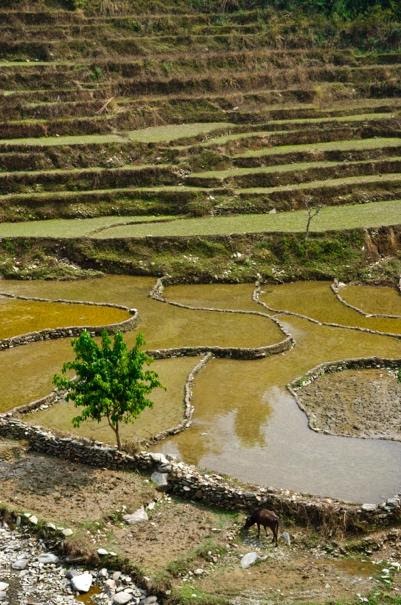Economic benefits of saving the ecology

This year’s World Environment Day theme ‘Ecosystem Restoration’ highlights the importance of protecting and reviving the natural habitats of living beings to restore our ecosystems.
This year, 5 June also marks the formal start of the UN Decade for Ecosystem Restoration which aims to prevent, halt and reverse the degradation of nature on every continent and every ocean. Ecosystem restoration is important to combat climate change, end poverty and prevent mass extinction of species.
Food, climate regulation, soil conservation, landscape conservation are some of the 24 categories of ecosystem services that play a vital role in global and national economies which have been identified by the Millennium Ecosystem Assessment (MEA).
Some of the main benefits of the 118 ecosystems categorised in Nepal include maintaining air quality from forest ecosystems, climate regulation through absorption of greenhouse gases, recharging groundwater, assisting in agroforestry by heling natural pollination, biodiversity protection, providing food, firewood, biomass and medicinal herbs for local communities.
Ecosystems also play a significant role in cultural services such as recreation and religious pilgrimage, and eco-tourism in Nepal. Such services provide livelihood and an increase in quality of life for millions of Nepalis.
Nepal is part of the ratified Paris Agreement and has submitted its second Nationally Determined Contribution (NDC) that aims to keep the global temperature to limit the global temperature to 1.5°C above industrial-era and zero greenhouse emission by 2050. Nepal has also signed the Kyoto Protocol, Sustainable Development Goals (SDG), the Convention on Biological Diversity (CBD).
Climate change exacerbates all the other problems that Nepalis face with their natural-resource based livelihoods, agriculture-based economy and poverty, illiteracy and social exclusion. Despite having negligible contribution to the global greenhouse emission, Nepal is the fourth most vulnerable country to climate change.

Overexploitation, illegal and unsustainable harvesting practices, encroachment, unplanned infrastructure development are some causes leading to the loss and degradation of forests. The Chure Hills are already over-exploited, resulting in increasing water scarcity in Tarai.
On top of all this, the climate crisis has complicated ecosystem management. An increase in temperature and precipitation patterns means vegetation and the species range are moving to higher altitudes.

There are ways to address this. Terrace farming, plantations, controlled grazing, improved forest management practices, adoption of bio-gas, and the ban on hunting and fishing in protected areas.
“Nepal has established an impressive system of conservation of biodiversity, focusing on species, ecosystems, habitats, and biomes over four decades,” says Pem Kandel, Secretary at the Ministry of Forests and Environment (MoFE). “Local communities outside of the protected areas are also conserving the ecological integrity of Nepal’s ecosystems.”
Globally as well as locally, Ecosystem-based Adaptation (EbA) is the key to addressing the impact of the climate crisis by using biodiversity and ecosystem protection as a way to live with changes in climate and weather.
One example of EbA in Nepal is the Panchase Protected Forest Area near Pokhara where local communities have revived ponds for rainwater harvesting and recharging groundwater. Using locally available soil and stone, the community restored natural ponds and protected them from encroachment.
“Just reviving a pond can bring back traditional conservation knowledge, restore the ecosystem and provide downstream benefits,” says Dil Bahadur Bhattarai of the Panchase Protected Forest.
Pokhara Valley is also a pioneer in another innovative scheme called Payment for Ecosystem Services which makes nature-friendly practices economically sustainable. Essentially it means downstream communities pay those up the mountain for the benefits they accrue from the protection of the ecosystem.
For example, villages that have protected their forests have helped communities that depend on fishing on one of Pokhara’s lakes, Rupa Tal by reducing sedimentation, pollution and conserving groundwater. The cooperative pays a percentage of the revenue it earns from aquaculture on the lake to communities upstream for protecting the forest.


Photos: LI-BIRD
The Rupa Tal initiative was designed by LI-BIRD (Local Initiatives for Biodiversity Research and Development) a Pokhara-based non-profit that has done extensive work on agrobiodiversity conservation and ecosystem restoration to improve local livelihoods.
"The increase in fish productivity, the yearly increase in net profits for the Rupa Lake Restoration and Fishery Cooperative and other lakes in Pokhara’s Lake Cluster such as the Begnas, Khaste, Maidi, Dipang are replicating Rupa’s successes with its Payment for Ecosystem Service,” says LI-BIRD’s Balaram Thapa.
Riverbank farming in Mohattori is another of Nepal’s best practices in ecosystem services. Upstream conservation through reforestation, water conservation, and flood control, communities downstream were able to re-cultivate on floodplains not only providing economic welfare but also conserving the riverine ecosystem.
With limited resources, Nepal has conflicting and competing priorities such as food security, livelihoods, development, infrastructure, and protecting land and livestock. Ecosystem protection is not high on the list of priorities.
Nepal is now working with its international partners on a green post-Covid recovery framework that addresses climate impact, improve livelihoods, and build resilience.
“This support framework aims to accelerate low-carbon, climate-resilient development by prioritising green job creation and investment to maximise Nepal’s growth, reduce emissions and vulnerability, and is sustainable,” says Simon Lucas of the Foreign, Commonwealth and Development Office (FCDO) in Kathmandu.
Every dollar spent on ecosystem restoration can create up to 30 dollars in economic benefit. The use of nature-based solutions not only protects the environment, but provides economic benefit to local communities.
As the experience of Pokhara and Mahottari have shown, protecting the ecosystem preserves biodiversity, conserves natural resources, strengthens local economies and allows local people to adapt to the climate crisis.
Diya Rijal is a communication consultant for the UK Government-funded Policy and Institutions Facility.




